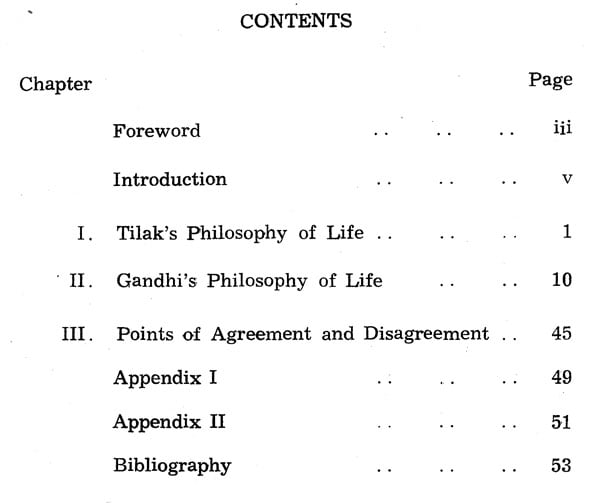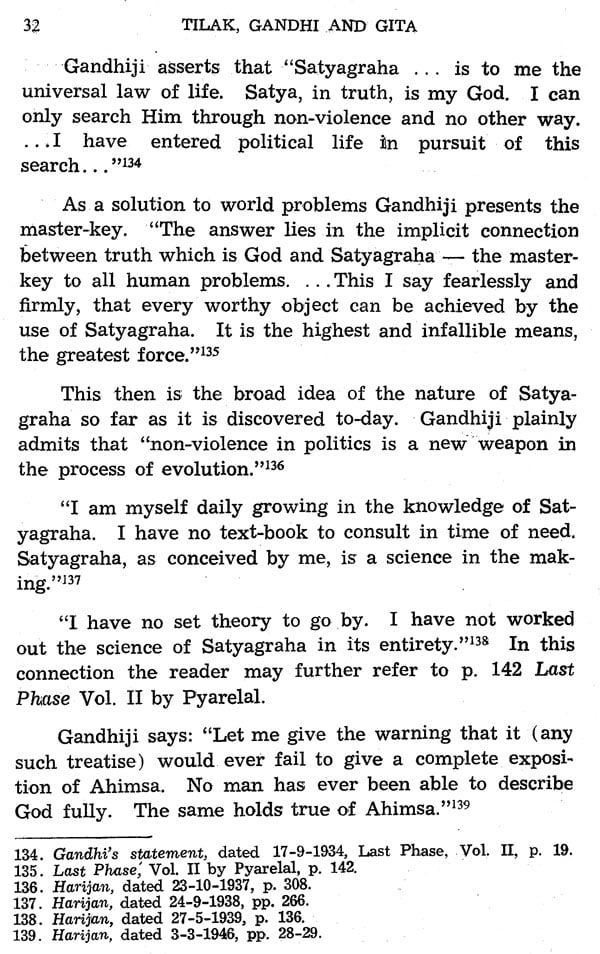
Tilak, Gandhi and Gita (An Old and Rare Book)
Book Specification
| Item Code: | NAY146 |
| Author: | D.K. Gosavi |
| Publisher: | Bharatiya Vidya Bhavan, Mumbai |
| Language: | English |
| Edition: | 1983 |
| Pages: | 55 |
| Cover: | PAPERBACK |
| Other Details | 8.50 X 5.50 inch |
| Weight | 90 gm |
Book Description
He was a law graduate and started practice in Satara. He took part in the freedom movements of 1930, 1932 and 1942 and was jailed. In 1940 when individual Satyagraha was launched, he took a list of the satyagrahis from Maharashtra to Mahatma Gandhi for approval, in his capacity as the President of the Maharashtra Pradesh Congress Committee.
He was a member of the Maharashtra Legislative Assembly from 1946-1952 representing Satara District.
In 1954, he shifted the arena of his activities to Poona and worked as Secretary of the Committee appointed by the Government for writing the history of the freedom movement. He was a member of the Bharatiya Dharma Tatvajnana Samskriti Mandal and helped in raising funds for the Gandhi Smarak Nidhi. He was associated with the Maharashtra Rajya Prohibition Mandal for ten years and was its President for 2-3 years.
He was an erudite Sanskrit scholar and a keen student of Bhagavad Gita and its several commentaries.
Shri Gosavi passed away on 27th May, 1980.
The present treatise was in the manuscript stage when he passed away. The Bharatiya Vidya Bhavan was good enough to accept this publication and the Gandhi Smarak Nidhi also helped in its own way.
This is a small book and centres on the philosophies of Lokamanya Tilak and Mahatma Gandhi. Both of them were very much impressed by the Bhagavad Gita and their philosophies of life were derived from their interpretation of the Gita.
The writer is at his best when he analyses the subject of his book. There are only three chapters: (i) Tilak's Philosophy of Life, (ii) Gandhi's Philosophy of Life and (iii) A comparative study. I have no hesitation in saying that this compendium is a source-book for future research in the subject.
Shri Gosavi has been very assiduous in listing the quotations from the writings of both the great national leaders, putting them in proper form, analysing them and drawing conclusions from them. Much of the book is in the form of quotations from the writings of the two leaders. Shri Gosavi's own conclusions are given in a few, short paragraphs. But the conclusions are drawn with great care and precision. The work is done with care and a full understanding of the subject.
Really speaking, the philosophies of life of the two leaders are not 'personal' philosophies. They have to be looked at from the national context.
Book's Contents and Sample Pages








